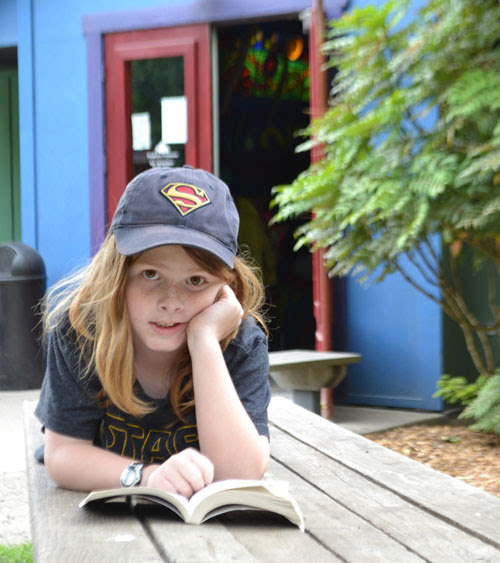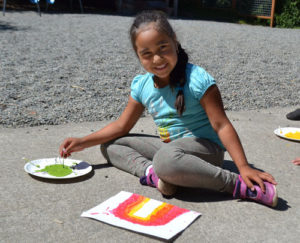— from The Funhouse Commons —
(Originally posted on Schools Out Washington)
 When we imagine Orcas Island, many think of vacation, natural beauty, and often wealth, but as Krista Bouchey, Executive Director at The Funhouse Commons explains, “The majority of families who call the island home are working-class and struggle with issues faced by communities whose economy revolves around tourism.”
When we imagine Orcas Island, many think of vacation, natural beauty, and often wealth, but as Krista Bouchey, Executive Director at The Funhouse Commons explains, “The majority of families who call the island home are working-class and struggle with issues faced by communities whose economy revolves around tourism.”
The Funhouse Commons is a non-profit organization that serves a critical niche in this island community, providing afterschool and summer programming to around 54% of the youth population. Located near the only schools on the island, The Funhouse Commons provides afterschool programming to 25-60 kids a day in first through sixth grades and runs a full-day program during the summer.
Krista knew that her program was vital to the community as one of the few options for out-of-school time activities. Like many of us, she sought a process to show the program’s impact on kids through data in order to make the case to funders, schools, and families.
A few years ago, Krista attended SOWA’s Bridge Conference and discovered the Youth Program Quality Assessment. She secured funding to work with SOWA through our quality improvement services, and is now a firm believer that assessment, coaching, and training is a game-changing process, leading to staff buy-in and engaging youth in a more authentic way.
 “When you’re in a rural community, it often feels like nobody understands your issues because a lot of research comes from urban areas”, Krista explains. “Problems are different in rural areas, but we still have problems. What I value about the YPQA tool and intervention process is that it translates across different community types and is more about how we interact with and support youth in our programs no matter what the content of our program focuses on or where we provide services.”
“When you’re in a rural community, it often feels like nobody understands your issues because a lot of research comes from urban areas”, Krista explains. “Problems are different in rural areas, but we still have problems. What I value about the YPQA tool and intervention process is that it translates across different community types and is more about how we interact with and support youth in our programs no matter what the content of our program focuses on or where we provide services.”
Krista has especially gained a great deal from the follow-up coaching part of the process. She usually guides the coaching session based on the program needs, and then SOWA’s Sheely Mauck provides concrete supports and ideas.
As Sheely explains, “It’s exciting to meet with Krista and her team as they brainstorm ideas, discuss challenges, and think critically about what they can do to create more opportunities for their youth to learn and grow.”
For example, as a program serving younger kids, some of the activities in the training curriculum are geared more towards older youth. Krista and her staff were able to work with Sheely to simplify activities and make them age-appropriate while still staying true to the core value around youth voice and youth leadership.
She has also been trained in providing the Youth Work Methods Series trainings herself, making the quality of her program more sustainable.
“It’s just not realistic to have a budget where we can send staff to trainings considering the cost of ferries and other transportation.” Krista has even been able to open up her trainings and offer them to staff at San Juan Islands Parks & Recreation.
Krista has seen a change in the youth as well as they develop more ownership of the program because they have been engaged in the planning, which staff value and encourage. “As Halloween approaches, we see the youth taking the lead with planning our annual Halloween party and involving community in the process,” Krista explains. As the youth take leadership, they become invested in the outcomes and want to create events and activities that are meaningful to them and their peers.
As to Krista’s advice to other rural providers, she truly believes that the investment in quality reaps benefits for the program, staff, and youth. Engaging in the quality process has also connected Krista to School’s Out Washington’s broader network and initiatives.
“I can’t say enough that I really like being a part of what SOWA is doing in terms of other trainings and legislative efforts. I’m trying harder now to keep my foot in the bigger picture. Even though we are all so strapped doing the work at our individual programs, it’s really important to see what’s going on elsewhere and to connect as a field to reach some of our broader goals.”
**If you are reading theOrcasonian for free, thank your fellow islanders. If you would like to support theOrcasonian CLICK HERE to set your modestly-priced, voluntary subscription. Otherwise, no worries; we’re happy to share with you.**









Congratulations, Krista and team, for this well-deserved recognition.
Awesome, Krista, Emilie and Sara: I loved working with you and you are doing good work this this community! – kristin